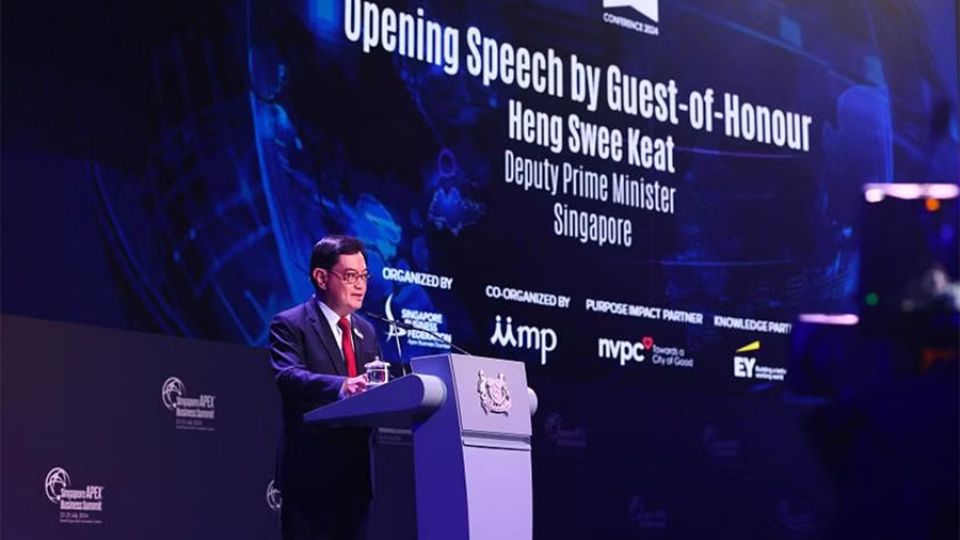July 24, 2024
SINGAPORE – Eight years ago, Singapore launched a programme to restructure its economy and ensure it remains competitive and fit for an uncertain future.
The restructuring process, which included sharpening the long-term survival instincts of local workers and businesses, involved tailored transformation plans for 23 industries, and covered 80 per cent of the economy.
While those efforts have grown the overall economic pie for Singaporeans, technological advances and job uncertainties, climate change and geopolitical shifts will continue to have major implications for the country and its future, said Deputy Prime Minister Heng Swee Keat.
In that light, the country must be prepared for a future of continued change, he said.
Between 2016 and 2023, the Singapore economy achieved real, or inflation-adjusted, value-added growth of 2.8 per cent a year, while labour productivity grew by 2.1 per cent a year over the same period, DPM Heng said.
“On both value-added growth and labour productivity, Singapore performed better in the past seven years than many other advanced economies of comparable population size,” he added.
This has had a tangible impact on people’s lives and livelihoods, with the median income of full-time Singapore residents growing by 1.5 per cent a year between 2016 and 2023.
DPM Heng was delivering his opening remarks at the July 23 opening of the second Singapore Apex Business Summit. He also launched a report that chronicles Singapore’s economic transformation journey since 2016.
The summit, held at Sands Expo and Convention Centre, was first presented by the Singapore Business Federation (SBF) in 2022, and in 2024, it aims to address mounting business challenges such as disruptions to trade and supply chains, and rising protectionism.
DPM Heng added that the Government-led Committee on the Future Economy, the Future Economy Council and the SBF have been key to ensuring the economy’s transformation is a success.
He also shared insights on how Singapore can stay sustainable and resilient amid constant change.
Singapore’s continued efforts to transform can be impactful if the country can tap and combine its resources and expertise to equip and support its businesses and workers.
As it has in the past, tripartism will remain a powerful tool in navigating the uncertainties of the future.
In Singapore, tripartism refers to a collaborative approach adopted by the Manpower Ministry, National Trades Union Congress and Singapore National Employers Federation in promoting shared economic and social goals. Its aim is to arrive at win-win outcomes for all parties in a non-confrontational and objective manner.
DPM Heng said tripartism will enable important opportunities for workers through platforms such as the Jobs Transformation Maps and Career Conversion Programmes.
Other initiatives also help the country build a talent pipeline for workers to gain exposure to regional and global corporate leadership roles.
Singapore must remain open to the world and deepen its partnerships with like-minded collaborators, particularly in the area of sustainability.
“One of the key challenges going forward is sustainable development. It is very important for us to take this seriously because climate change is an existential threat for Singapore as well as many other island states,” said DPM Heng.
He added that Singapore looks forward to fostering win-win partnerships among governments as well as businesses.
Examples of such partnerships include digital economy agreements with partners such as Australia, New Zealand, Britain and South Korea, and a world-first Green Economy Agreement with Australia.
Singapore has also established a network of bilateral and regional free trade agreements with 30 countries to facilitate trade.
DPM Heng noted that the country’s future will depend heavily on leveraging science, technology and innovation.
For its part, the Government has committed $28 billion between 2021 and 2025 towards deepening its research and innovation capabilities in areas such as urban solutions and sustainability, health and human potential, advanced manufacturing, digitalisation and biotech.
“Because issues like pandemics and climate change can be tackled only if countries around the world work together, we also aim to build our research and development collaborations with like-minded partners from around the world,” he said.

